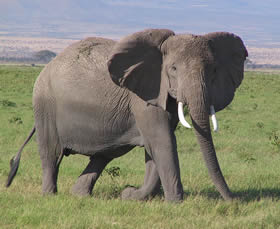 "Leadership in elephants: the adaptive value of age (335.01 kB)", was published online in Proceedings of the Royal Society B on 16 March 2011. Joyce was one of the authors of the paper in a study led by Karen McComb in Amboseli as part of the Amboseli Elephant Research Project. The research shows, once again, the importance of older leaders in elephant society. Unfortunately, because older elephants tend to have larger tusks, and because they come to the fore in defence of their families, they are precisely the individuals targeted by poachers. Protecting the lives of these wise leaders of elephant society is one more reason to put an end to the gruesome trade in the teeth of these intelligent animals.
"Leadership in elephants: the adaptive value of age (335.01 kB)", was published online in Proceedings of the Royal Society B on 16 March 2011. Joyce was one of the authors of the paper in a study led by Karen McComb in Amboseli as part of the Amboseli Elephant Research Project. The research shows, once again, the importance of older leaders in elephant society. Unfortunately, because older elephants tend to have larger tusks, and because they come to the fore in defence of their families, they are precisely the individuals targeted by poachers. Protecting the lives of these wise leaders of elephant society is one more reason to put an end to the gruesome trade in the teeth of these intelligent animals.
Abstract: The value of age is well recognized in human societies, where older individuals often emerge as leaders in tasks requiring specialized knowledge, but what part do such individuals play in other social species? Despite growing interest in how effective leadership might be achieved in animal social systems, the specific role that older leaders may play in decision-making has rarely been experimentally investigated. Here, we use a novel playback paradigm to demonstrate that in African elephants (Loxodonta africana), age affects the ability of matriarchs to make ecologically relevant decisions in a domain critical to survival— the assessment of predatory threat. While groups consistently adjust their defensive behaviour to the greater threat of three roaring lions versus one, families with younger matriarchs typically under-react to roars from male lions despite the severe danger they represent. Sensitivity to this key threat increases with matriarch age and is greatest for the oldest matriarchs, who are likely to have accumulated the most experience. Our study provides the first empirical evidence that individuals within a social group may derive significant benefits from the influence of an older leader because of their enhanced ability to make crucial decisions about predatory threat, generating important insights into selection for longevity in cognitively advanced social mammals.
Authors of the paper are Karen McComb, Graeme Shannon, Sarah M. Durant, Katito Sayialel, Rob Slotow, Joyce Poole and Cynthia Moss.
The paper has been presented in numerous media around the world - you will find this article with video (with late Echo and her family) on BBC Earth - Older female elephants are wiser matriarchs.
|
One of ElephantVoices' lion playbacks from 2005 showing the importance of older matriarchs at times when decision-making affects survival. Chloe and her family are startled by the sounds of nearby lions. They bunch together in self defense, and then matriarch, Chloe, takes the lead to inspect the lions. She moves forward, with a determined, aggressive posture, and then signals to her family to join her in the attack. Photos/editing by Petter Granli, narration by Joyce Poole, ElephantVoices. |

